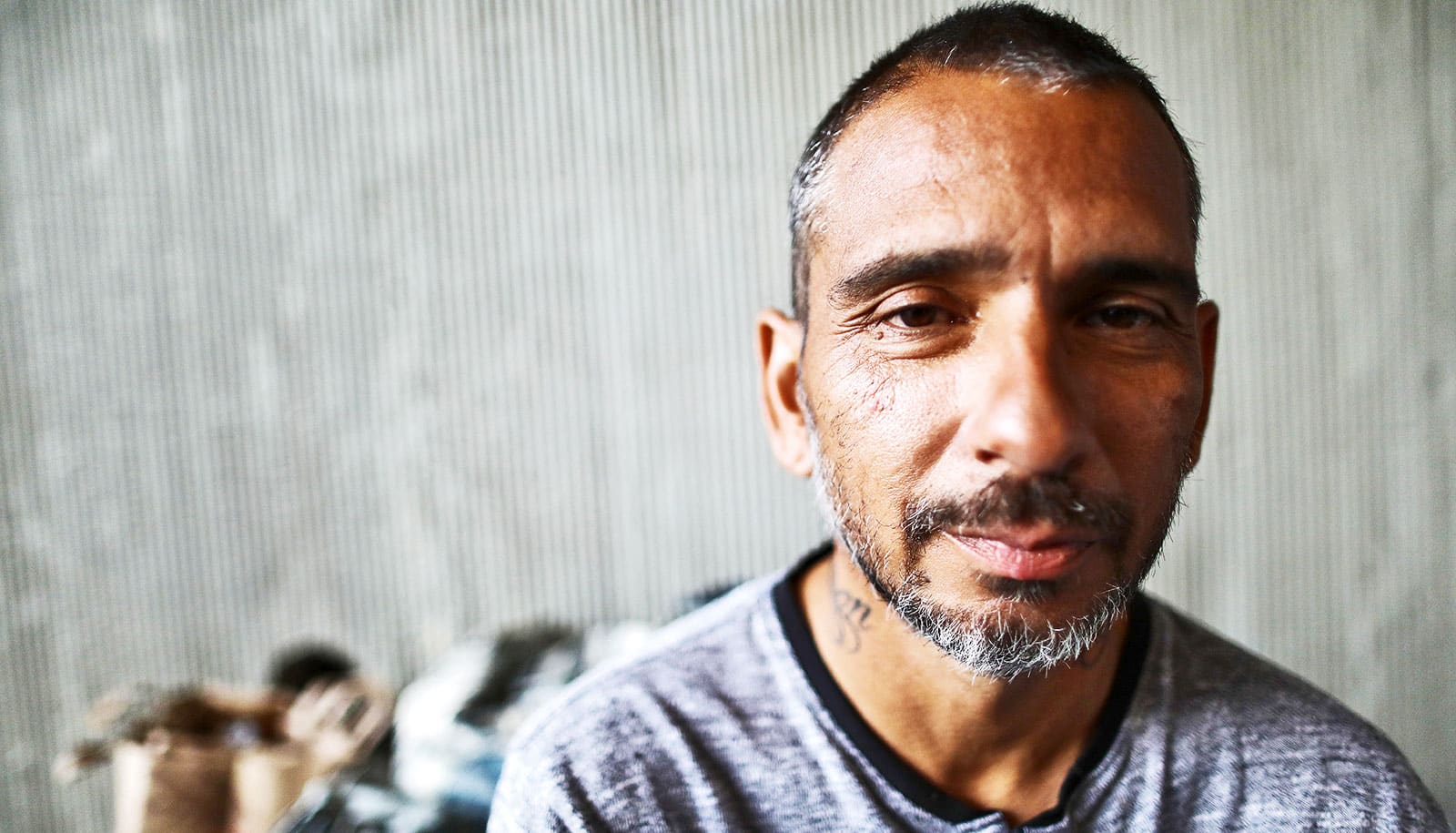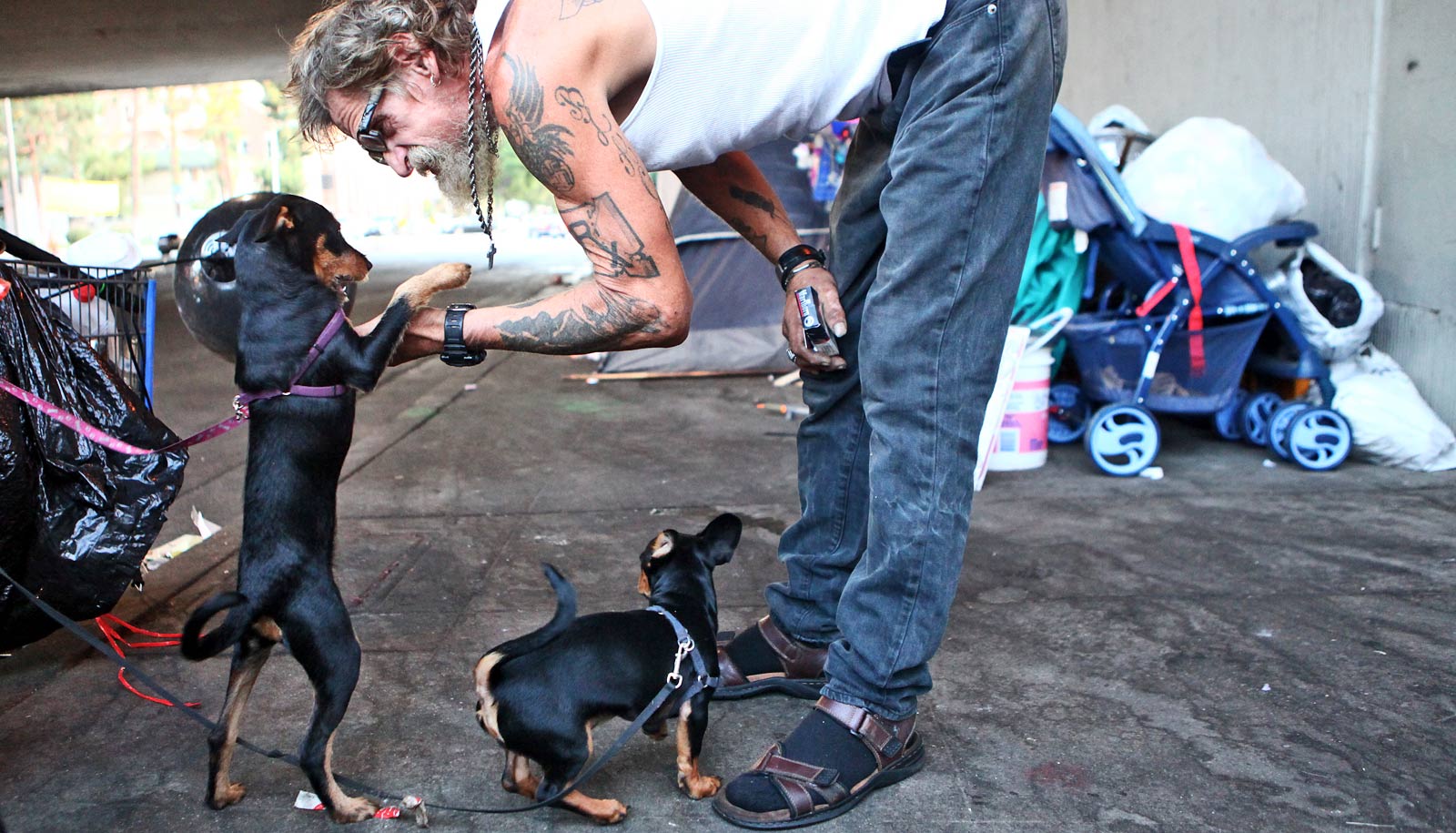One way to help veterans who are homeless is to advocate for more affordable housing, says Thomas Byrne.
The signs dot highway bridges and town halls, celebrating the return of armed services personnel from dangerous overseas missions. “Welcome Home,” they proudly, joyously, declare.
But for many veterans—carrying the visible and invisible scars of battle, more vulnerable to suicide, physical and mental illness, and substance use disorders—the message rings hollow: they might not even have a stable home to return to.
The phone number for the National Call Center for Homeless Veterans, a 24/7 hotline, is 1-877-424-3838)
Byrne, an associate professor in the Boston University School of Social Work, is an expert on homelessness, and among the researchers studying why veterans are more likely to land in shelters—and how to better help them.
He says that a lack of affordable housing can make it especially tough for former service members to find a stable home, and that those who want to help them should advocate for more economical options.
Byrne has studied housing insecurity in rural areas, the effectiveness of Department of Veterans Affairs (VA) housing programs, and the community and structural drivers of homelessness, such as income inequality and housing affordability.
His latest project is a major assessment of Supportive Services for Veteran Families, a program that provides grants to community organizations helping those at high risk of homelessness. One focus of the research is an initiative giving veterans flexible temporary financial assistance that they can use on anything from security deposits to utility bills.
“We’ve found it’s associated with better housing and health outcomes,” says Byrne, who is also an investigator at the VA’s National Center on Homelessness among Veterans and with the Center for Healthcare Organization & Implementation Research at the VA Bedford Healthcare System. “We’re also nearly there on a study that’s comparing participation in this program to a group of veterans who don’t get it, so we can as rigorously as possible estimate its impact.”
Byrne first became involved with the VA as a graduate researcher—but the work has taken on additional meaning in recent years.
“I have members of my immediate family who are on active duty,” says Byrne, “including one of my sisters and brother-in-law. I serendipitously became involved with the VA, but it also has a personal salience for me.”
Here, Byrne talks about why veterans might be at greater risk of homelessness, the stigma faced by those dealing with housing insecurity, and what we can all do to help:
How big of an issue is homelessness among veterans? I’ve read that while veterans have historically been at greater risk of homelessness, the situation is improving.
The research, including some studies that I’ve been a part of, does show that veterans do face an elevated risk of homelessness relative to the general population. Folks may think that veterans face an elevated risk due to stressors they might experience while they’re on active duty, combat experiences.
When you look specifically within members of the military, combat exposure and PTSD are associated with higher risk of homelessness. And when we are talking about the most recent generations who served in Iraq and Afghanistan, there is some evidence that the dynamics of their homelessness is different, in that they appear to become homeless more quickly after exiting the military as compared to older veterans.
But, broadly speaking, it’s not entirely clear why veterans, as a group, have a higher risk than the civilian population. One possibility is that it has to do with the fact that military veterans are not necessarily representative of the general US population.
There’s some evidence that you see the elevated risk of homelessness for veterans first show up when the military switched to an all-volunteer force. What you get is not necessarily a broad-based sample of the population entering the military. You have folks who have socioeconomic characteristics, and maybe life experiences, that may have put them at an elevated risk of homelessness even prior to their military service. And so they remain at an elevated risk once they discharge. I think that’s certainly a plausible theory.
Veterans experiencing homelessness are mostly male, but are there other things, apart from service, that they have in common?
Military veterans are a heterogeneous group with respect to premilitary, military, and post-military risk factors. There’s been some research that’s tried to look explicitly at those three things. A lot of the risk factors for homelessness in the general population—adverse life experiences, lack of economic resources—also apply to members of the military.
For premilitary risk factors, adverse childhood experiences can contribute; during military service, traumatic experiences—whether it’s combat exposure, military sexual trauma; and then post-military factors—job loss, financial difficulties, dissolution of relationships. One of my colleagues did a study looking at risk factors among military veterans who served in the post-9/11 era, and one of the strongest was military pay grade, which is a proxy for socioeconomic status.
How do you define homelessness, because different groups categorize it in different ways?
When we’re talking about homelessness in the United States, there is a definition that is shared by the Department of Veterans Affairs and by the Department of Housing and Urban Development.
On a given night, there are around 37,000 veterans experiencing homelessness across the United States.
And it is basically people who are living in emergency shelters or transitional housing, residential programs specifically meant for people experiencing homelessness, or people who are unsheltered—literally living on the streets or in places not meant for human habitation.
When we’re talking about the number of veterans experiencing homelessness, it doesn’t count people who might be doubled up, or couch surfing, who might be in housing arrangements that are less than ideal or unstable in some way.
For some context, on a given night, there are around 37,000 veterans experiencing homelessness across the United States, and that’s a number that’s decreased by about 50% since 2009. Homelessness is a dynamic phenomenon: most folks who are homeless only experience homelessness for a fairly short period of time, and so there’s a lot of turnover in the population. The big reductions in homelessness among veterans over the past 10 to 12 years has a lot to do with the investments that the Department of Veterans Affairs has made in housing programs.
There’s still a lot of stigma around homelessness. Can you humanize it for us?
In some ways, the stigma of homelessness is an extension of the stigma that surrounds poverty in this country more broadly. Some of that is just deeply rooted in what we—broadly speaking, as an American society—value in individualism and self-reliance. We see poverty and homelessness as moral failings of individuals, when in reality there’s a lot of evidence, including work that I’ve done, that links homelessness in the aggregate most strongly to housing market conditions, the lack of affordable housing.
It’s often the product of structural factors that mean we’re going to have some amount of homelessness, and then individual vulnerabilities that place people at a higher risk. There’s a lot of stigma, but there ought not be. For most veterans and people who are experiencing homelessness, it’s a really temporary phenomenon. It’s not something that people fall into and never escape from—it’s a housing crisis that people experience. More often than not, if people get some assistance to resolve that housing crisis, they’re likely to remain stably housed thereafter.
I think there’s less stigma when we’re talking about military veterans specifically, because of the social status that they hold in society. They’re a group of folks whom we as a society and our political leaders have decided merits special attention, and that’s come in the form of big investments in housing programs specifically for veterans experiencing homelessness. There’s been a lot of success from those efforts. I think that goes to show what can happen when you destigmatize the issue of homelessness and focus on solutions that work to address the problem.
According to Pine Street Inn, “56% of all homeless veterans are African American or Hispanic.” It also seems the improvements you’ve talked about haven’t necessarily reached them evenly. What is causing those huge disparities?
It’s part and parcel of the same structural forces that underpin lots of inequities in our society. When we’re talking specifically about housing, you can bring into the conversation things like redlining and discrimination in rental markets that may have historically made it more difficult for people of color to access housing and to build wealth, which might buffer them in the instance of an economic shock. What holds true in the broader population likely holds true for military veterans, as well.
What’s one thing everyone reading this can do to help veterans and others experiencing homelessness?
Ultimately, what’s at the root of homelessness, both among veterans and more broadly, are the issues of affordable housing and housing affordability. Wherever it’s within your power, advocate for the expansion of housing for folks who are experiencing homelessness or just everyone in general.
Part of what motivates me to do this work is that I think having a safe, decent place to live is a really fundamental right, and prerequisite to having any kind of decent life. Everyone would want that for themselves and for their family members, so just think about it in those terms.
If people want to get involved more specifically, there are certainly organizations that are working directly with veterans experiencing homelessness. There’s a number of them here, locally, in Boston and in Massachusetts that are doing really great work. There is also sometimes a gap where some funding sources can’t be used to pay for certain things that people might need to set up their apartment, for example, so there’s a real need for philanthropy to fill in and provide funds.
Lastly, what message or advice would you have for veterans—or families of veterans—reading this who are concerned about their housing status?
It’s not unusual for me to get emails directly from veterans who are experiencing homelessness. And there are two resources that I direct folks to.
The first is the National Call Center for Homeless Veterans, a 24/7 hotline where trained staff work to connect veterans and others with VA and non-VA services. The phone number is 1-877-4AID-VET (1-877-424-3838). The second is Supportive Services for Veteran Families, a homelessness prevention and rapid rehousing program funded by the VA, but operated by community-based agencies. The VA’s website has a comprehensive list of providers throughout the country and their contact information.
Source: Boston University


